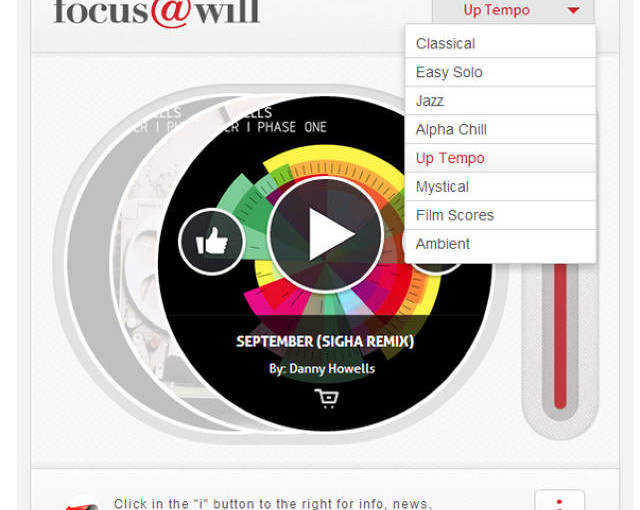We regularly turn on tunes to help drown out the world while we work, study, or read. But the wrong music, played at the wrong time, can actually bog down your ability to think straight, research has shown.
However, focus@will, a music streaming service that broadcasts music rigorously tested for its ability to quiet your busy brain in precisely the right ways, is trying to crack the code behind music that, as CEO Will Henshall puts it, delivers “productivity on demand.”
Here’s how it works: Most people can concentrate on a task for a maximum of about 100 continuous minutes before taking a break to stretch, drink some water, or go to the restroom. Focus@will claims it boosts the productivity of each of those 100-minute cycles by playing music that’s been rigorously engineered to soothe a part of your brain known as the limbic system, which is believed to be responsible for emotion and motivation rather than rational thought. So, among other things, it’s the part on constant lookout for triggers relating to danger, food, and sex. And the memory-forming, motivational messages it sends you are loud as hell.
“If you’re incentivized to be engaged in a good book or a movie, you can sit there for about two hours straight,” Henshall says. “But when you’ve got to be productive on demand, maybe write to a deadline, while your limbic system is going, ‘Bacon, bacon, bacon,’ that’s difficult to do.”
At the heart of focus@will library is the custom-built Focus Genome system that weighs specific characteristics such as musical key, speed, and emotional value. It then uses all that individual track information to determine the most effective playlists for concentration. It’s similar to how Pandora’s Music Genome Project works to create its radio stations. (And, like Pandora, focus@will uses “Thumbs Up” and “Skip” features to smarten up its algorithm.)
Currently, you can choose from eight genres of music, such as classical, ambient, or (our office favorite) “alpha chill.” Focus@will commissions its music from composers and artists to whom it pays an annual licensing fee, so its library includes many original tracks that you won’t be able to find on other services.
But focus@will is not another Internet music service like Pandora, Spotify, or Rhapsody, Henshall says. For one, focus@will is not an entertainment company—it’s in the business of cognitive enhancement. He says to think about it as a service built around music that’s not really meant to be listened to, thus making it a complement, rather than a competitor, of the Spotifys and Pandoras. For example, you won’t find songs with vocals or alto saxophone on focus@will, because those sounds trigger a flareup in your brain that affect your concentration.
It’s in focus@will’s best interest to remain a use-case specific service—Henshall says he’s found that users who only plug into focus@will to enhance productivity begin to experience a Pavlovian conditioning effect that significantly boosts the effectiveness of the system. Conversely, listening to focus@will during other activities dilutes its focusing effect.
“If you want to be home and have a dinner party, we highly recommend the other music services,” Henshall says. “But this is a different use of music. This becomes your go-to sound set that will trigger you into a productive state.”
Though focus@will is currently free, Henshall says he’s interested in eventually offering a paid subscription model for a small annual fee of around $25.
“People are already using music as a productivity tool as it is, to help them focus at work,” he says. “It shows there’s a market out there, and focus@will is focused on solving that problem.”
Focus@will, which has been alpha testing with several hundred users including lawyers, coders, and journalists, is now in private beta. Use code fastcompanyfocus to try it out for yourself.
